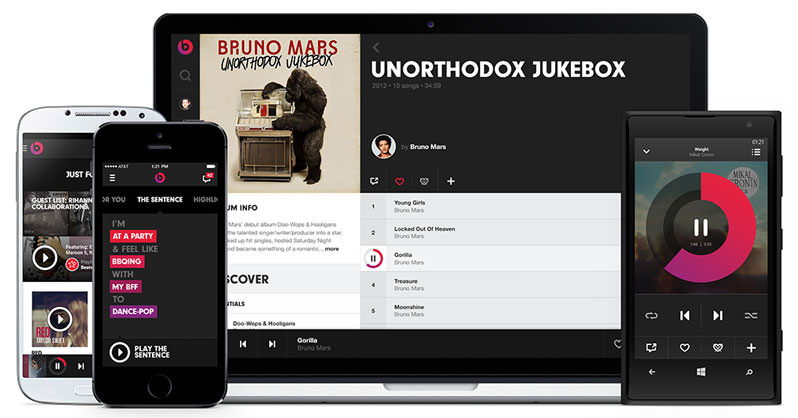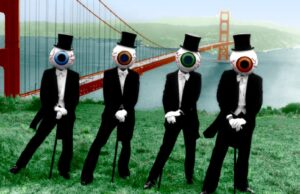How Beats Music Drove Me Back to Spotify
In an overcrowded market, Spotify holds on to a special cachet. Beats Music
Beats Music
Beats Music
Jimmy Iovine and Dr. Dre made gobs of money producing genuinely good music. They made heaps more turning mediocre headphones into $350 fetish objects, in a venture known as Beats. Now they’ve decided the next step in their continuing collaboration is to buy the defunct MOG streaming music service, one of many in a crowded marketplace, and refashion it, with the help of Trent Reznor and other music brand-people, into Beats Music.
The service launched Tuesday at the industry standard price of $9.99 a month for unlimited ad-free music and without the industry standard option of an ad-supported free subscription tier.
Perhaps because I somehow lost my vast CD collection, I’ve always been attracted to streaming music services. Before music was easily thieved, I sunk many thousands of dollars into plastic discs and the prospect of replacing them for a monthly fee is much more attractive than buying them all over again.
Over the years I’ve tried now-dead MOG, Microsoft’s ill-fated Zune, Spotify, Pandora, Rdio, Songza, iTunes Match and Google Play Music All Access (worst name?). In most cases, I paid for the premium offering, which usually meant better sound and the ability to download songs to a mobile device.
On Tuesday, I signed up for a trial of Beats Music. A few hours later, I signed out, canceled my subscription to Google’s All Access service and switched back to Spotify for the third time.
I think I’m ready to settle down, and here’s why. When it comes to streaming, there are three pillars of paramount importance: the catalog, the platform and the ability to discover new music.
Spotify offers streaming at “extreme” quality, on- and offline. That’s a must, for any of these services, and most comply (Pandora and iTunes are lacking in this area, in my experience). The app, whether for iPhone or Android, opens instantly and begins playing music just as quickly. The same cannot be said of its competitors. Spotify has millions of tracks, as do most of its rivals, but also — and this is more vital — the backbone to play them on demand without many hiccups. The closest in terms of infrastructure is Google’s offering, but the app is slow as hell to load, whether on the Web or a phone, and its discovery options leave much to be desired. Also, one area Spotify has been a leader in is in allowing users, even those listening on mobile devices, to stream for free. This allows for much-needed flexibility with people who want to drop in and out of the paid tier.
Let’s talk about curation, since it’s the big selling point of every app that isn’t named Spotify. Both Google and Beats brag that they have actual humans compiling playlists for your listening pleasure. Music is like a drug in the sense that it’s easy to get bored and hard to find a new fix, so in many ways the advantage of these services, which are more akin to radio than record stores, is finding the new stuff you (hopefully) dig.
When I opened Beats, I was presented with a list of genres and artists and asked to rank them in terms of love, like and hate. I liked that approach, figuring it would give me better results, but when all the work was done, I was presented with a customized list of tracks I had zero interest in listening to. In other words, fail. A little digging revealed some interesting playlists I could spend time enjoying, but how often will those be updated, particularly without computer assistance?
Speaking of which, Google’s discovery engine is as powerful and accurate as a hopped up hitchhiker stabbing at the radio dial. The star feature is called “I’m feeling lucky,” but a better name might be “I’m feeling trapped in music hell.” Seriously, Google, at this point you know what I listen to, what I read online, where I drink coffee, where my favorite Ikea is located and what color underwear I buy online. Do you mean to tell me in the age of Big Data you don’t realize I’m not a J-Lo fan?
The upside of Google, as is the case with iTunes’ streaming offerings, is that you can incorporate your own library, including songs not available for streaming. In my case, that usually means the Beatles, and it’s annoying to switch apps to find them. But annoying I can live with.
Spotify, realizing that it’s not especially great at curation, has outsourced the task to its millions of users. Playlists abound, and they’re genuinely good. A fan of the show “Girls” on HBO? Subscribe to the Spotify playlist, which active users keep synced with the newest episodes.
Beats has clearly put a lot of attention into the look and feel of its design, and that’s welcome, but it doesn’t really have anything to do with music. I don’t look at album art when I’m driving in the car (and I hope you don’t either). Spotify isn’t the most handsome service, but it’s not ugly, and it’s gotten a lot better.
Meanwhile, the Swedish company continues to innovate and leverage new features that force competitors to up their game.
To summarize: Catalog? Spotify is on par, if not leading. Platform? Nobody beats Spotify. Discovery? Spotify will get the job done.
But there’s more to the story. I felt something missing playing around on Google Music and Beats. Radio has a social magic — you’re not listening in a vacuum, you’re part of a larger listening community. Rdio tried to profit from this idea, but the wonky app drove me away ages ago. Spotify just feels like where it’s at. My friends use it. Their friends use it. People I’ve never met use it. Somehow this little, patient, foreign company has come to take over the music business and more or less succeeded. Far from winning me over, Beats just reminded me of what I was missing. And so Spotify wins the monthly battle for my $10.
A note to my music making friends, of which I’m privileged to have a few. I am well aware that these streaming services are generally not good, to say the least, for the income of independent musicians. This saddens me, but it’s also true that Spotify has yet to turn a profit, despite its market dominance. I wish people paid more for music, but I also wish people paid more for articles and blog posts. We live in a weird world, where content is cheap and the people who make it and, often those who sell it, struggle to make ends meet. I don’t think Spotify is the enemy of musicians, just as I don’t think Google News is the enemy of journalism. We may have to find new models. In the meantime, at least there is a mechanism that succeeds at exposing our labor to a wider audience.
Your support matters…Independent journalism is under threat and overshadowed by heavily funded mainstream media.
You can help level the playing field. Become a member.
Your tax-deductible contribution keeps us digging beneath the headlines to give you thought-provoking, investigative reporting and analysis that unearths what's really happening- without compromise.
Give today to support our courageous, independent journalists.






You need to be a supporter to comment.
There are currently no responses to this article.
Be the first to respond.